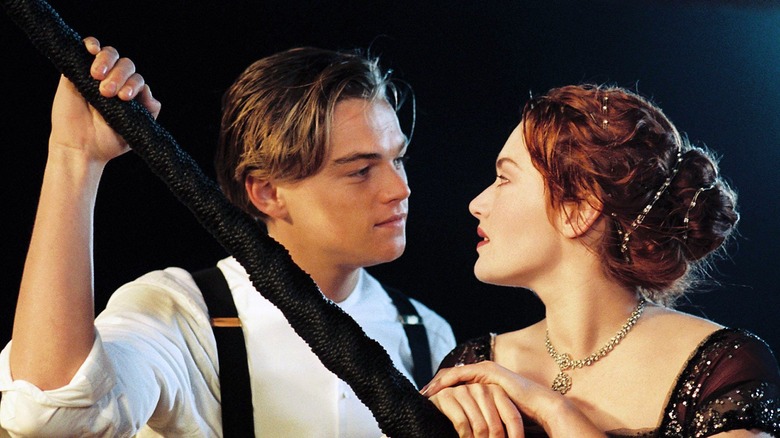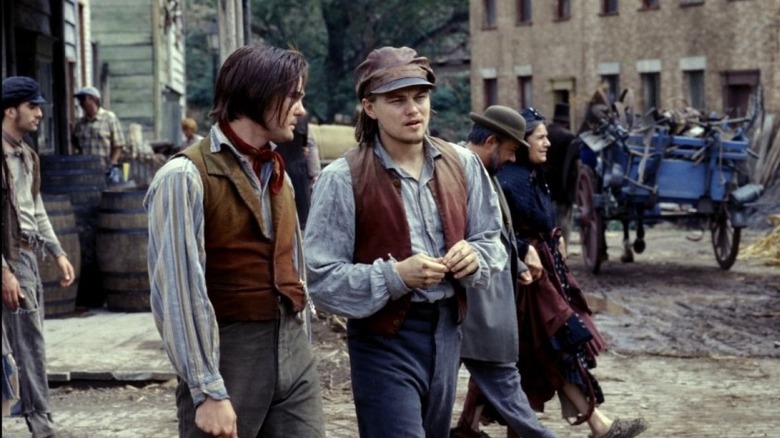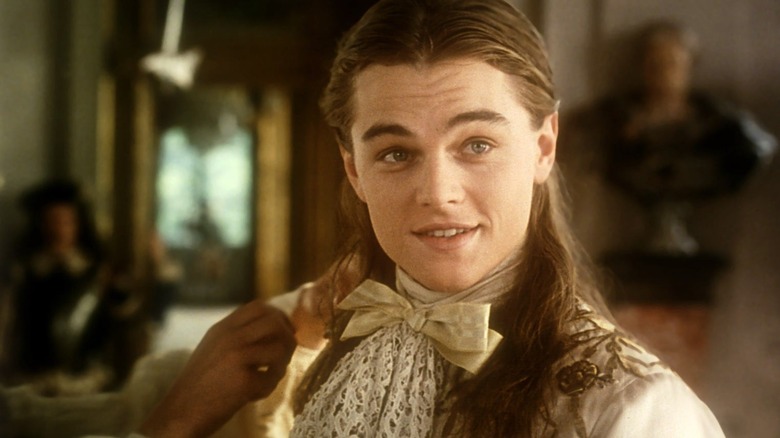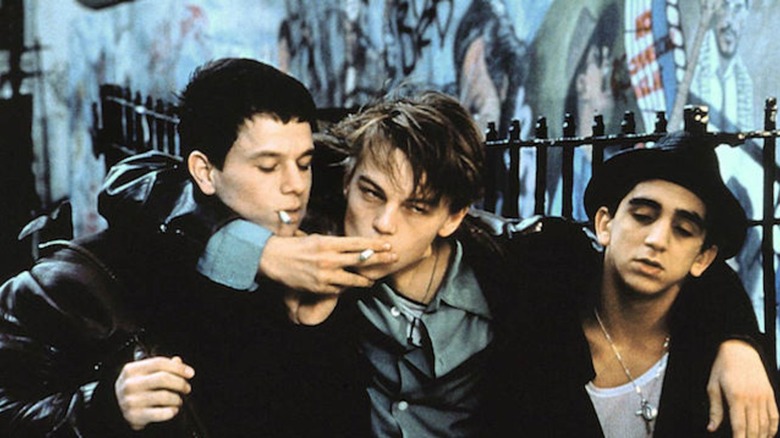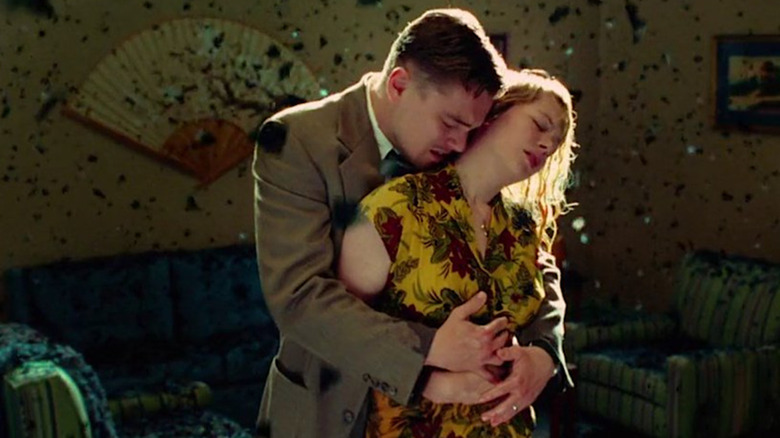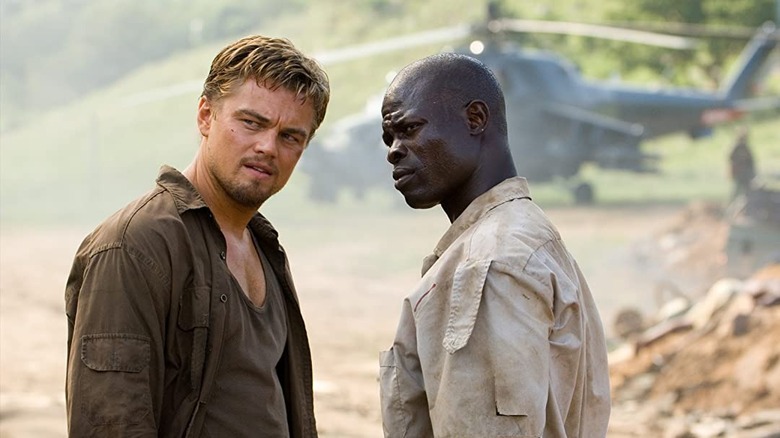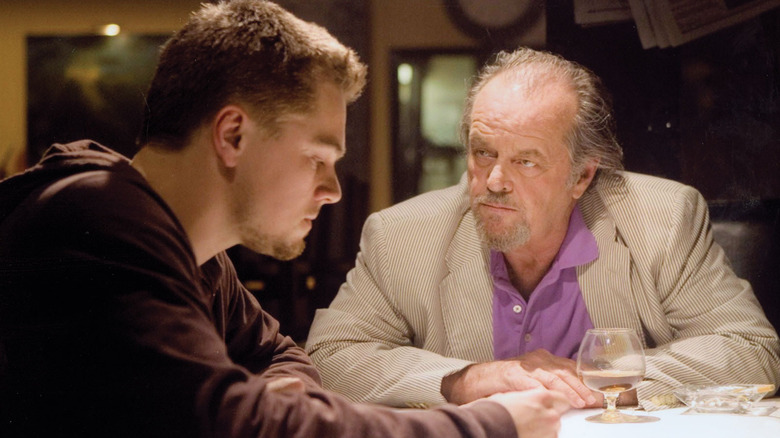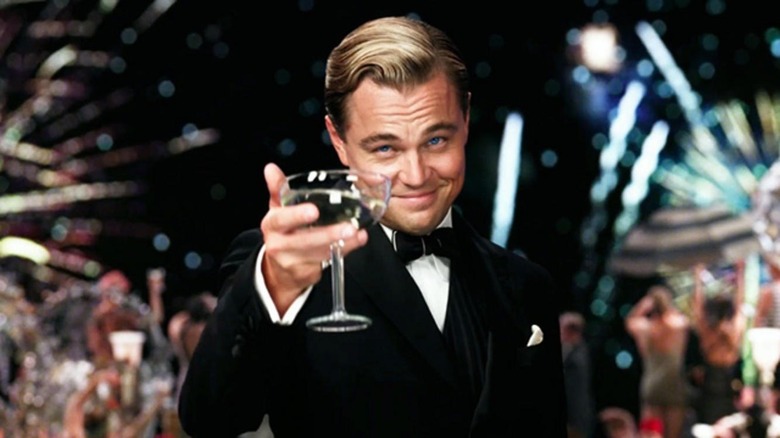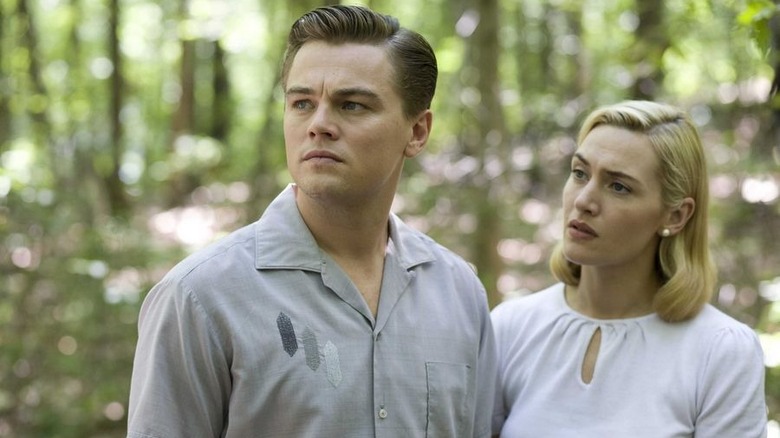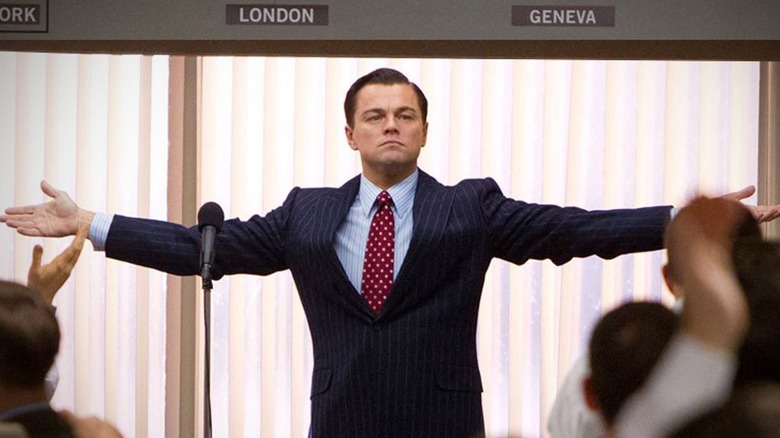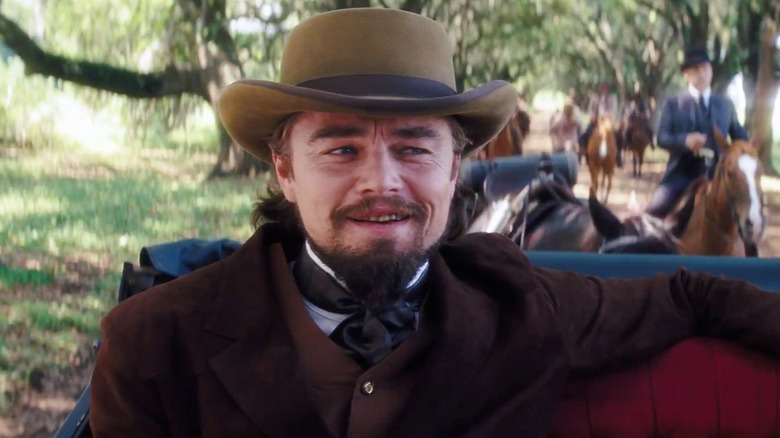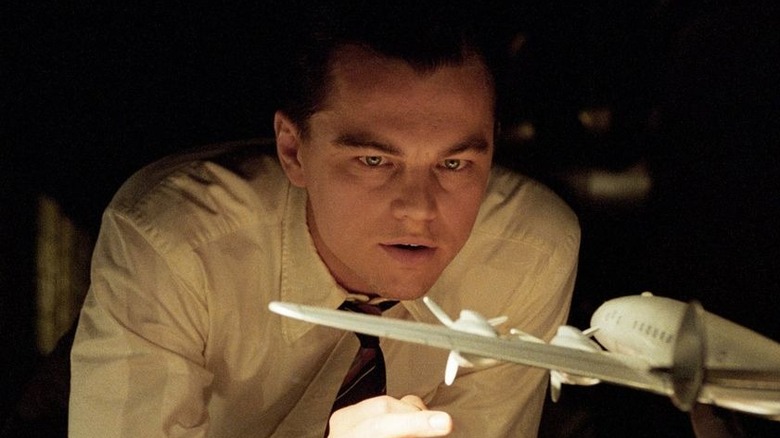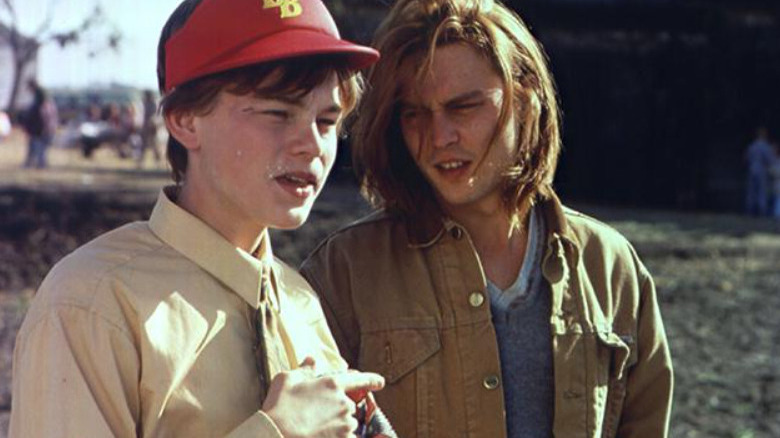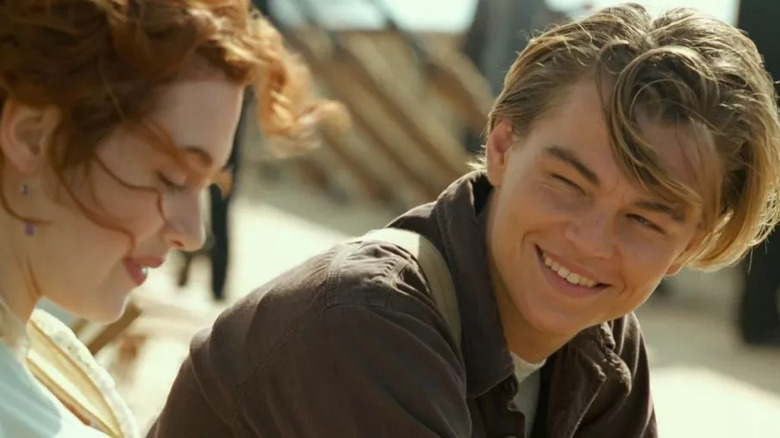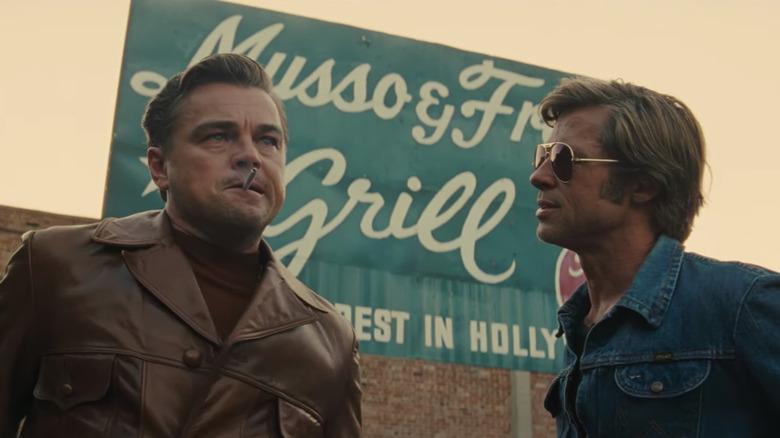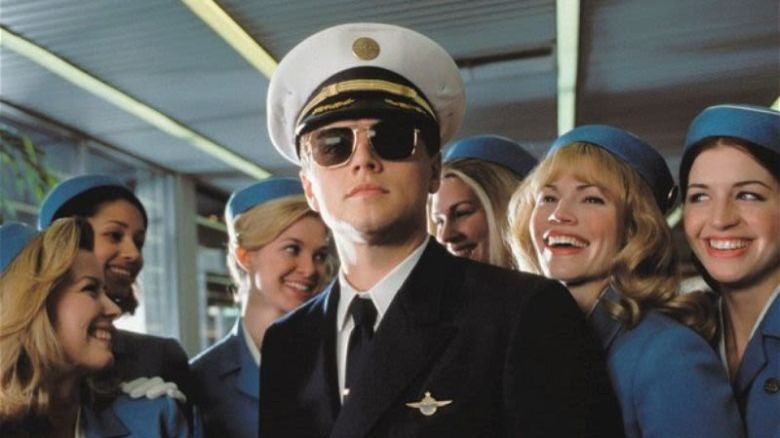Leonardo DiCaprio's 15 Best Films, Ranked
Since the early 1990s, Leonardo DiCaprio has been wowing audiences around the world. His career has served as a model for young actors who rise to fame quickly, and feel pressure to avoid being typecast in teen heartthrob roles. Rather than settling into a comfortable, if creatively uninspired, run of romantic lead performances, DiCaprio purposefully sought out challenging opportunities that would prove his range.
And for a long time, these efforts went unrewarded. Despite being one of the most famous and professionally consistent actors in Hollywood, he went without an Academy Award until 216 when he finally won for his work in "The Revenant." (Was this an award he received because the general consensus was that he was overdue rather than a reflection of the film's actual quality? Perhaps. But that's an argument for another day.) And as a whole, DiCaprio's career is worth celebrating because, at almost every turn, he has avoided taking the easy paycheck, instead choosing to work with directors he respects and in roles that he finds creatively fulfilling.
15. Gangs of New York
Every great film collaboration has to have a beginning, and although "Gangs of New York" may not be the best film Martin Scorsese and Leonardo DiCaprio have worked on together, it deserves recognition for being the first. You can see the chemistry between the director and actor early on, and they would go on to make a number of other movies — with DiCaprio eventually becoming one of Scorsese's most frequently utilized performers.
In "Gangs of New York," DiCaprio is cast opposite Daniel Day-Lewis, the two playing a pair of adversaries in the famously dangerous Five Points neighborhood of Manhattan in the mid-1800s. Day-Lewis plays Bill the Butcher, who murdered DiCaprio's character's father when he was a child. Now grown up, DiCaprio's Amsterdam Vallon vows revenge on the infamous gang leader. We can quibble with some of the creative decisions in the film, but both performances are beyond reproach, and it's easy to see why Scorsese would so often return to DiCaprio over the next 20 years.
14. The Man in the Iron Mask
After performing as the romantic lead in two mega-hits, DiCaprio was uncomfortable with his status as a Teen Beat cover boy, worrying that it would prevent him from being taken seriously as an actor. That's why "The Man in the Iron Mask" is such an interesting choice for him to follow up "Titanic" and "Romeo + Juliet." The Alexandre Dumas classic about a royal intrigue with a prince hidden away in a prison, his identity concealed, would give the actor the rare opportunity to hide his face, rather than capitalize on it.
In the dual roles of the cruel King Louis and the kind and gentle Philippe, DiCaprio gets to have his cake and eat it, too: He plays the sensitive leading man that audiences would come to expect from him, but he also gets to experiment with a darker character that would otherwise be against type. Say what you will about "The Man in the Iron Mask," but it's a fascinating moment in his filmography.
13. The Basketball Diaries
A cautionary tale about the dangers of drug abuse, "The Basketball Diaries" is nothing short of harrowing. Leonardo DiCaprio plays Jim Carroll, a young high school basketball player who, alongside his friends, becomes embroiled in a crippling heroin addiction that quickly takes over his entire life. The film itself leans a bit too much into the shock value of the ordinary all-American boys and their rapid entry into the world of drugs, giving it a movie-of-the-week quality at times.
But DiCaprio's performance stands out, and it's his overwhelming desperation that gives "The Basketball Diaries" its emotional resonance. If nothing else, he creates one scene that defines the film: His mother has locked him out of their apartment in a devastating act of tough love, and he sits outside the door begging for her to let him in, animalistic cries of despair that quickly turn to rage.
12. Shutter Island
Leonardo DiCaprio may not always be the good guy, but in every film he has an undeniably strong presence and sense of self. So it's especially disconcerting to see his performance in Martin Scorsese's psychological thriller "Shutter Island." He begins as the sort of confident, authoritative law enforcement officer that we've come to expect from DiCaprio at this stage of his career: Edward "Teddy" Daniels investigating a strange and forbidding psychiatric institution on an island in New England.
But over the course of "Shutter Island," reality becomes murky, and Daniels begins to question his very identity. His performance comes from a different place of vulnerability than we've seen from DiCaprio in the past. When he was younger, he had a raw, sensitive quality that frequently influenced his work. But here, as a full-grown man, this uncertainty he possesses is informed by rage and aggression, an altogether dangerous and more disturbing frame of mind.
11. Blood Diamond
Somewhat dodgy accent aside, "Blood Diamond" would represent a step forward in DiCaprio's ever-evolving quest to be taken seriously as an actor. In a lot of ways, it's a story so dramatic and emotionally wrought that it's almost actor-proof: A man from Sierra Leone attempting to rescue his son who has been kidnapped and forced to become a child soldier is devastating beyond words. And they could have gotten by with actors much less skilled than DiCaprio and Djimon Hounsou. Nevertheless, the two leads put in towering performances that would earn both of them Academy Award nominations.
DiCaprio plays a smuggler from former Rhodesia (now Zimbabwe) who agrees to help Hounsou's character, Solomon Vandy, find his missing son in exchange for the massive diamond Vandy swears that he knows the location of. The role incorporates DiCaprio's penchant for flawed heroes, as well as capturing his interest in political activism. ("Blood Diamond," as you may be able to tell from the title, is fiercely critical of the unethical diamond trade.)
10. The Departed
Between DiCaprio, Matt Damon, and Mark Wahlberg, "The Departed" has no shortage of former teen heartthrobs trying to take on gritty roles. DiCaprio plays a cop undercover in the Boston mob, while Damon plays a mobster infiltrating the Boston Police Department. "The Departed" is packed with tension as both attempt to maintain their covers ... and avoid becoming unwittingly empathetic towards the people they're supposed to be spying on. In the process, the line between the two becomes increasingly blurred: The more you pretend to be something you're not, the less certain you are of your identity in the first place.
This and "Blood Diamond" came out within the same year, and both smoothed DiCaprio's transition to darker, more adult roles. It would also help cement DiCaprio's status as one of Scorsese's favorite leading men: "The Departed" was their third collaboration in four years, and the pair would go on to make many more films together in the future.
9. The Great Gatsby
If there's anyone in the world who should be making an adaptation of F. Scott Fitzgerald's Jazz Age classic "The Great Gatsby," it's Baz Luhrmann, whose entire mantra revolves around shallow opulence and style over substance. And if there's anyone who should play its mysterious hero Jay Gatsby, it's Leonardo DiCaprio. He's always been an engaging actor, but there's something about his presence as a movie star that keeps the audience at arm's length — we know him, but we don't really know him. And that's what makes him such a great Jay, leaning into the layers and layers of artifice that build the character from his humble origins to one of the wealthiest men in New York.
It's also a delight to see him as a romantic lead once again: After years of taking on darker, more serious roles, his performance as Jay Gatsby strikes a nice balance. He's not a conventional leading man, but his dynamic with Carey Mulligan as Daisy Buchanan is bright and vibrant, even if it will eventually be clouded by melancholic regret.
8. Revolutionary Road
Leonardo DiCaprio and Kate Winslet will probably go down in history as one of the all-time great onscreen pairings. Their work together is effortlessly charismatic, and they have a personal bond dating back to their time on "Titanic" that makes them jump off the screen. "Revolutionary Road" is a bummer because it takes all of that natural chemistry and pours it into a heartbreakingly authentic relationship in crisis.
The pair star as Frank and April Wheeler, a married couple in the 1950s whose relationship begins to fall apart under the pressures of soul-crushing suburban life, with tragic consequences. They completely disappear into the roles, bringing to life a dark vision of the American dream as something oppressive and ultimately unattainable. Fans wished for so many years for DiCaprio and Winslet to star in a film together again, but the unrelenting gloom of "Revolutionary Road" probably wasn't the type of romantic collaboration they were envisioning.
7. The Wolf of Wall Street
Sometimes you have characters who maybe aren't the greatest people, morally speaking, but there's still some ineffable quality that makes them the tiniest bit redeemable. That's not the case in "The Wolf of Wall Street." There's no devil's advocate argument to be made for Jordan Belfort, the patron saint of greedy, borderline sociopathic financial bros everywhere. Leonardo DiCaprio plays him with absolutely nothing going on behind the eyes: He's driven only by an intense need to accumulate money and status, rising up the ranks on Wall Street with little regard for anyone who might get in his way.
We've seen this type of character before, via Michael Douglas's Gordon Gekko in "Wall Street," but the key difference is that he's not presented as the protagonist of the film. Scorsese and DiCaprio both take a certain glee in centering their story around an objectively scummy, cruel, hypercompetitive character if for no other reason than to make a statement about the only kind of people who can succeed in a society that worships money.
6. Django Unchained
Leonardo DiCaprio has often played characters that fall just outside the traditional male lead: They're just a little bit irredeemable, or unlikeable, or immoral. But it's rare that he is given the opportunity to play an all-out villain as he does in Quentin Tarantino's "Django Unchained," and the effect is chilling. Here he plays Calvin J. Candie, a gregarious, sociopathic slaveowner whose plantation, Candyland, is a carnival of horrors. He thinks nothing of, for example, forcing two enslaved men to fight one another to the death as a form of entertainment, or having a man torn apart by dogs.
His performance is jarringly off-kilter, vacillating wildly between sociable and threatening. Candie is dangerous and frightening for precisely this reason — his behavior is unpredictable, and you can't tell what he's going to do next. A far cry from the sensitive, vulnerable heroes he played in his youth, DiCaprio's work in "Django Unchained" is a reminder of how multi-faceted he is as a performer.
5. The Aviator
What better way to make a push for an Oscar than by doing a big, splashy biopic about a famously neurotic Hollywood legend? With Martin Scorsese behind the camera, Leonardo DiCaprio's headlining performance as Howard Hughes in "The Aviator" was bound to be a success, with critics as well as general audiences.
As Hughes, DiCaprio is nothing short of mesmerizing. He once again proves his ability to put in the type of performance that dominates the screen, something that would be absolutely essential for a film like "The Aviator," a massive epic where Hughes is featured in nearly every single scene. His work would see him nominated for best actor at the Academy Awards, although his costar Cate Blanchett as Katharine Hepburn would be the only one of the two to take home a statue. For DiCaprio, the hunt for an Oscar would continue for several more years.
4. What's Eating Gilbert Grape
Leonardo DiCaprio seems like a pretty stand-up guy. But he has committed one very serious crime in his professional career, and that was stealing "What's Eating Gilbert Grape" entirely out from under his fellow actor Johnny Depp. The understated indie drama would star Depp at the height of his fame, playing the discontented 20-something buckling under the pressure of caring for his morbidly obese mother (Darlene Cates) and intellectually disabled younger brother Arnie (DiCaprio.)
Although his role is merely a supporting one, DiCaprio imbues Arnie with such a raw, intense empathy that it's actually startling to watch. Only 19 years old when "What's Eating Gilbert Grape" was filmed, his performance is effective precisely because it lacks self-consciousness: You can't see him thinking through how to play the character — he just does it. DiCaprio was rewarded with a best supporting actor nomination at the Academy Awards, making him the seventh youngest actor to receive that honor.
3. Titanic
Buckle up folks, this is a big one. Looking back, it's difficult to fully comprehend how quickly and terrifyingly "Titanic" launched Leonardo DiCaprio's career into the stratosphere. He had done a bunch of smaller films in previous years, then "Romeo + Juliet" lit the fuse so that when "Titanic" come out and broke box office records all over the world, his face was everywhere.
There are a few reasons for this. The character of Jack, a wayward artist who begins a relationship with the upper-class Rose (Kate Winslet) aboard the doomed ocean liner Titanic, is essentially a perfect man. He's kind, funny, interesting, intelligent — everything you would want in a romantic lead. DiCaprio plays him with such an effortless charm that from the first time he appears on screen, the audience falls in love. And all of this is without even mentioning his quintessentially '90s floppy hair, an iconic look that would see him adorning high school lockers all across the country.
2. Once Upon a Time in Hollywood
If Leonardo DiCaprio's first collaboration with Quentin Tarantino allowed him the opportunity to take on the villain role, "Once Upon a Time in Hollywood" would let him live out a hero fantasy. It's Hollywood in the late 1960s, and DiCaprio plays Rick Dalton, a fading star who happens to live right next door to Roman Polanski and Sharon Tate. He's acutely aware of his career trajectory, but isn't willing to give up the spotlight just yet. DiCaprio is at his best playing the earnestness of Dalton, both his desire to be taken seriously as an actor and his tendency towards self-sabotage.
But perhaps most importantly, "Once Upon a Time in Hollywood" gives DiCaprio the chance to be something he rarely is on-screen: funny. His dressing room meltdowns as he berates himself in the mirror for drinking too much are so much more hilarious than they have any right to be. And after a string of serious performances that seemed to be geared towards winning him an Oscar, this is the first time in quite some time that he looks like he's having fun in a role.
1. Catch Me If You Can
Frank Abagnale is an emotionally complex character, but there's also an element of boyish fantasy to his exploits. In what other role would you get to play a counterfeiter, an airline pilot, a doctor, and a lawyer all at once? "Catch Me If You Can" is one of Steven Spielberg's most stylish films, and it rests almost entirely on the shoulders of Leonardo DiCaprio in its lead role. Based on the true story, it details the adventures of a mid-century conman, and the bizarrely codependent relationship he would have with the persistent investigator spending most of the 1960s trying to catch him (played by a Boston-accented Tom Hanks.)
"Catch Me If You Can" is slick and fast-paced. It almost has to be in order to keep up with Frank, who is always on the run. DiCaprio imbues him with the overwhelming charisma that any self-respecting conman needs to have in spades, but never lets the audience forget his deep vulnerabilities. Frank is in perpetual motion because he is pathologically unable to stop and face his problems, ever since he was 16 years old and running away from home to avoid dealing with his parents' divorce.
